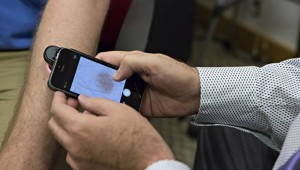Stanford researchers say they’ve created a new artificial intelligence system that can identify skin cancer as well as trained doctors can. According to a study they published in science journal Nature, the program was able to distinguish between cancerous moles and harmless ones with more than 90 percent accuracy.
The researchers trained the system by feeding it nearly 130,000 images of moles and lesions, with some of them being cancerous. The system scanned the images pixel by pixel, identifying characteristics that helped it make each diagnosis. Using machine learning, the A.I. grew more accurate as it studied more samples.
The A.I. software achieved “performance on par with all tested experts.” The system correctly identified 96 percent of the malignant samples, and 90 percent of the (generally harmless) benign ones. For the doctors in the study, those numbers were 95 percent and 76 percent, respectively.
This could have huge implications: The study points out that 5.4 million new cases of skin cancer are diagnosed each year in the U.S. alone. If installed in smartphones, the authors say, this technology could provide a simple, low cost form of early detection.
Ask me anything
Explore related questions





